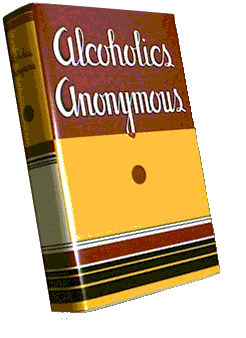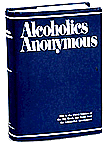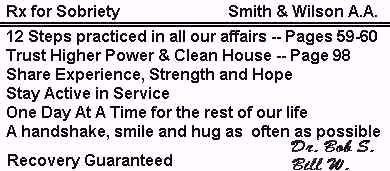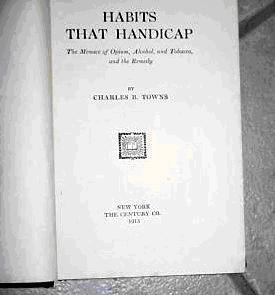

 Click The Images To Go To Page Indicated In The Flag
Charles B. Towns, Ph.D. In 1917, Charles B. Towns, Ph.D., who had founded a Manhattan hospital at the turn of the century as a "drying-out” facility, wrote a groundbreaking article for The Modern Hospital magazine in which he asserted, "There is no such thing as 'curing' a case of alcoholism. There is nothing on earth you can do to prevent any human being from taking up the use of alcohol again if he wants to."
Bill Wilson, the founder of Alcoholics Anonymous started his recovery at that hospital. When the time came in 1938 to finance the writing of the Big Book of Alcoholics Anonymous and the selling of shares in Works Publishing Co., Dr. "Silky" Silkworth, Bill's physician and a friend of A.A., helped to convert Dr. Towns into a great A.A. enthusiast and had encouraged him to loan $2,000 toward preparation of the book, a sum that was increased to $4,000 and later paid back in full. But he would not buy stock, he wanted a note for security! Dr. Towns also approached Fulton Oursler, then editor of Liberty magazine, who commissioned feature writer Morris Markey to write the article "Alcoholics and God" for the September 1939 issue, giving A.A. its first national publicity. As we know, Ebby Thacher, sober in the Oxford Group 2 months, and living at Calvary Mission run by Rev. Sam Shoemaker, had visited with Bill shortly after Armistice Day 1934. Bill Wilson then made his first visit to Calvary Mission on or about December 7, 1934, just days before his last admittance to Towns Hospital, December 11, 1934. This could very well account for the influence on Bill’s fascination with the conversion experience whether he realized it or not. He had researched much religious material as well as Richard Peabody’s "Common Sense Of Drinking," and perhaps the works of Charles B. Towns, although it is not well known that Charles Towns wrote three important books on alcoholism: "Habits That Handicap" (1915), "Reclaiming The Drinker"(1931), and "Alcohol And Drug Sickness"(1934). Bill, with his inquiring mind, may well have read them in his previous trips to Towns Hospital. Towns was very emphatic about never talking down to an alcoholic, or scolding a man that you are trying to help. (12 Steppers and Al-Anons take note.)
There are other articles by or about Towns listed below, and the text of two of them.
Habits That Handicap:
Help for the Hard Drinker; What Can Be Done to Save the Man Worth While (New York, 1912)
"The Injury of Tobacco and its Relation to other Drug Habits," 83 Cent. Mag. 766-772 (1912)
The Peril of the Drug Habit, and the Need of Restrictive Legislation (New York: Century Co., 1912)
Federal Responsibility in the Solution of the Habit-forming Drug Problem (New York, 1916)
The Personal Problem Confronting the Physician in the Treatment of Drug and Alcoholic Addiction (New York: Charles B. Towns Hospital, 1917)
The Present and Future of Narcotive Pathology, in Three Parts (New York: Charles B. Towns Hospital, 1917)
The Alcoholic Problem Considered in its Institutional, Medical, and Sociological Aspects, in Three Parts (New York, The C. B. Towns Hospital, 1917)
NEW DRUG LAW HITS ACCIDENTAL USERS
THEIR SUPPLY SHUT OFF
Drug Fiends of the Underworld Will Be Little Affected by Statute Governing Physicians' Prescriptions.
The Boylan anti-drug law, which was passed by the New York Legislature on March 28, and which becomes effective on July 1, will result in serious consequences if State and city authorities do not make immediate provision for the treatment of "innocent" drug slaves, according to Charles B. Towns of 119 West Eighty-first Street, who framed the law.
"There are thousands of persons in this city alone who have unconsciously become addicted to the use of habit-forming drugs and who are not in any way to blame for their condition," Mr. Towns said yesterday. "Some of these innocent victims may not yet know that they have become drug fiends. No estimate can be made of their number. These are persons who, perhaps several years ago, were given drugs on physicians prescriptions to alleviate suffering from some disease or injury which, in most of the cases has since been cured. The administration of the drug, however, creates a craving for it which the patient cannot withstand, and after the cause for the first doses is gone the habit remains. The victims then secure more and more of the drug on their physicians' prescriptions. If the drug is denied them they become violently nervous and show all of the horrible symptoms of the deprived dope fiend within twenty-four hours; making it necessary for their physicians to renew the prescriptions.
"The new law provides that in the future, it shall be unlawful for any physician, veterinarian, or dentist to issue prescriptions for drugs except after a physical examination for the treatment of disease, injury, or deformity, and to prevent the forging of prescription blanks every doctor signing them must affix a record of his name in full, his office address, office hours, and telephone number, and to whom the prescription is issued, together with the date of issuance. It can be filled but once, and must be filled within ten days. It will also be unlawful for any person to fill such prescription without first verifying its authenticity by telephone or otherwise or to have drugs in his possession without authority. Aside from the fact that any dealer or physician found guilty of breaking the new law will be guilty of a misdemeanor, his license may be revoked upon his conviction.
"These new strictures will make it impossible for the innocent drug fiends to secure more drugs from their physicians. The law for the time being will hardly affect the drug users of the underworld, who have long known secret channels through which they can obtain their drugs. It will fall most heavily on the person who has broken no law in the past in securing habit forming drugs and will drive him--or her, for there are vast numbers of women who have become drug fiends in this manner--to seek illicit drug dens if other methods are not speedily provided. The law provides that persons who are found to be habitual users of such drugs shall be committed to a State, county, or city hospital or institution licensed under the State Lunacy Commission until they have been treated sufficiently to warrant their release. It takes only five or six days to cure a drug fiend in a hospital, but as yet the hospitals licensed by the commission have not made ample preparation for the treatment of more than a small percentage of the cases which should be sent to them when the law goes into effect if the highest good is to be derived from the law.
"The movement for intelligent legislation regulating drug traffic is comparatively young and New York's new law will not remedy conditions in this State, but it is a good beginning. It should attract the attention of intelligent people in other States, and should be imitated throughout the country. Until this is done, however, and uniform anti-drug legislation has been secured we will be handicapped by the fact that drug users in New York can send prescriptions across the river to New Jersey, or elsewhere, and have them filled with little inconvenience. The law provides that all orders for the wholesale purchase of drugs must be written on serially numbered, duplicated blanks furnished by the Commissioner of Health. This will keep track of all supplies of drugs purchased in New York, but druggists, or persons posing as druggists, will still be able to order from Philadelphia, or elsewhere on their regular letterhead paper or on fake letterhead paper. The need of national legislation is obvious."
Mr. Towns has prepared an act which he hopes to have passed by Congress imposing a tax upon and regulating the importation, production, manufacture and distribution of habit-forming drugs. Under the present Federal law, he said yesterday, the government asks no question concerning the disposition which is made of crude drugs imported into the country, but simply taxes them as they come in. His bill proposes that a close record be kept of every ounce of habit-forming drug that enters the country until it is finally consumed under orders from a reputable physician. There should also be legal provision, he said yesterday, to prevent the filling of prescriptions for drugs issued by any physician not a resident of the State in which the prescription is filled, so as to overcome the present interstate laxity. In setting an example in the matter for other States to follow, it was suggested it would be a good idea for the New York State Medical Society to prepare official prescription blanks exclusively for drugs and to have them copyrighted so that similar blanks could not be printed for illicit use.
When asked what he considered the principal cause of the widespread use of drugs, Mr. Towns said:
"In the six thousand cases I have studied, I have found that in every case in which the victim was a youth he had smoked cigarettes long before he began to take drugs." Effective universal anti-drug legislation, he said, would reduce lunacy and criminality about 40 per cent.
WAR IS INCREASING THE DRUG-CONSUMING HABIT Hospitals Develop Craving, Says Charles B. Towns, Who Urges Federal Action, No human intensity can compare with that of the drug user for his drug. Unrelieved, he will let nothing stand between him and it; neither hunger, nakedness, starvation, arson, theft, nor murder will keep him from the substance he craves. This is the opinion of Charles B. Towns of New York City, of whom Dr. Richard C. Cabot of Boston does not hesitate to say that he "knows, more about the alleviation and cure of drug addictions than any doctor I have ever seen." The man who first indorsed Mr. Towns and urged Dr. Cabot, to study his specific treatment for the drug-taker, was Dr. Alexander Lambert of Bellevue Hospital, Professor of Clinical Medicine at the Cornell University Medical College. And it is also the opinion of Mr. Towns that the war in Europe has resulted in a tremendous and unnecessary increase in the use of habit-forming drugs, and that the great need in our country at the moment is that Congress empower the President to appoint a committee of able men to investigate this whole matter in all its phases and make such appropriation as may be required to protect our soldiers from the insidious evil that is doing its work abroad. Mr. Towns is going to Washington in a few days with this object in view. He hopes to bring forcefully to the attention of President Wilson certain facts concerning the growth of the drug habit among the troops in Europe, together with the necessity that this country take up this whole subject by commission, because it is so far-reaching, involves so much detail, and affects so many and such varied interests that it would be impossible at this time to introduce in Congress legislation that would meet the case as it should be met. "I presume you have read in the papers," said Mr. Towns, "the account of the arrest of some illicit traffickers in habit-forming drugs in which an enormous quantity--- $500,000 worth, it is reported--- of such drugs was found and it was also stated that this organization had representatives in foreign countries and was carrying on a wholesale business in such drugs. This is of great interest and confirms my position, namely, that unless this problem is taken up internationally it will be impossible to reach such things, because, the present Federal and State laws on the subject are wholly inadequate." Before any legislation is proposed, Mr. Towns believes the subject should be investigated by the Federal Government and that its findings should be made public and studied as a preliminary to the enactment of any law or amendment to the present law. "With the united wisdom of Congress applied to the matter,'' he said a few days ago, "there can be no doubt that such an investigation as I have in mind would lay the foundation for Federal legislation that would once and for all solve this monstrous problem. Such action of Congress would mean not only a solution of this subject as far as the Federal Government is concerned; it would mean also a solution for the States. And it would, mind you, establish a legislative, medical, and sociological precedent that would give this country for the first time the primacy it ought to have in asking other countries to join with us once and for all in terminating this evil--- an evil which has now become not merely a series of isolated national problems, but a united world problem. "I have recently had a patient in this hospital who had been going through two kinds of battle in France. He won the Victoria Cross. But he also acquired the drug habit. The army hospital made a drug taker out of him. It has probably done the same for half a million other brave men. "Before enlisting in the present war he in South Africa, was awarded a South African Service Medal, and was honorably discharged. He went to France in August, 1914, and was in his first engagement on Aug. 25, 26, 27, and 28 when he was 'gassed.' "He told me that the physical condition produced by gas was similar to pneumonia in several respects. One being a contraction of the chest which makes it impossible for the patient to lie down. The patients, himself included, were carried into the hospital, set up against a wall, and immediately placed under the influence of morphine. He said it had been found that morphine was the only thing that would relieve a sufferer from the effects of gas. "As soon as the patients were able to help themselves and to use a hypodermic a mixture of this morphine solution was put on a table within their reach, and they were allowed to use it as often as they felt inclined. "Now, this soldier was not aware that he was becoming a morphine addict, but in those three months he became one. The treatment followed in his case was the usual one, and, so far as his observations went, each of the gas victims who entered the hospital for treatment left it a confirmed drug user. "He returned to the front and took part in the Hill 60 engagement, where his battalion was wiped out---the Eleventh Battalion of the Black Watch. He stood for an hour and a quarter at roll call, and was the only man who answered to his name. But he was wounded and went again to the hospital. He told them that he was up against the morphine habit, and they gave him what morphine he needed while there. "He left that hospital and joined the Royal Engineers. was again wounded, again went to the hospital for three weeks in March, 1915, and again was supplied with the drug during that time. Then he was sent to the Somme front, where itwas trench fighting. But he was still able to get the drug in any quantity from civilians. As he put it to me: 'Thousands and thousands of dollars' worth of drugs are being sold by the women who are following the army. "It is the firm conviction of this man that all those who have been through the war from the first and have been 'gassed' are takers of the drug. "On July 27, 1915, his officers had ordered the blowing up of a trench. My friend started with a crew of eleven men to cross 275 feet of tunnel toward the enemy, when, after reaching half the distance, shells from the Austrian guns fell short and blew the tunnelers to pieces. Where had been a tunnel was now only a hole. "My friend picked himself up and found that his leg was sprained and his back hurt. There was one fellow whose leg was blown off. My friend carried him over to their trenches so looked back and saw another companion trying to get up. So he carried him in. He carried back the whole eleven, and dropped when the job was finished. "When he knew anything again he was back in the hospital--- the same hospital at which he had remained previously for nearly three months. "He informs me that the hospital records show that while he was in them morphine was administered to him regularly. This will appear on the charts, but not the quantity. He has seen morphine administered to twenty men at one time from the same hypodermic; in fact, the nurses never refused morphine to any one who asked for it. "After he arrived in this country he went to Boston and the British Consul there arranged for him to go to Bermuda with the nurse. He stayed there about two weeks, but his cough got no better and he came back. He then went into the Maine woods, where he tried to rid himself of the drug habit, but found he could not. The open air did cure his cough, and he returned to Boston determined to conquer his addiction to drugs. A physician prescribed for him for four weeks, and he was taking as much morphine at the end of that time as he had been at the beginning. "This man told me that he was very discouraged, and had made up his mind to shoot himself. He talked the matter over with his wife, and they came to New York and saw me. He had only $71 left when he reached New York. I gave him the best room in the house, feeling that I owed it to the boys over there in Europe to do something. He is cured. "Now the basic way for the United States or any other country to deal with this question." Mr. Towns asserted, "to go at once and directly to the very root of the whole business, would be to restrict all use of opium to its crude form and to its forms as laudanum and paregoric. This would cut off all pecuniary interest in it, save for supplying it for legitimate medical needs in the crude form, and in its least harmful forms of laudanum and paregoric. Opium is produced only in a few countries--- practically none in our own country--- and it is only the manufacture of its alkaloids that requires such large outlay of capital in laboratory equipment. "Where an opiate is indicated there are very few instances in which the required results could not be had from the administration of the crude product. Crude opium is the least harmful form of opium that can be taken for it contains all of the alkaloids and may be taken either by the mouth or in suppositories. If the traffic in and sale of this drug was reduced to traffic and sale of crude opium it would not inconvenience the medical profession in its legitimate use of the drug in any way whatsoever find it would Immediately stop this large illicit traffic that has grown out of the habit-forming drug situation. "No possible good will come out of attempting merely to forbid the importation, manufacture or sale of heroin. The chemists are very clever and they would give us in another day some preparation of opium under some other trade name. And if it was not an actual preparation of opium they would claim that it was a synthetic one. The only way to meet such a habit-forming drug condition is, I repeat, to restrict the manufacture, sale, prescribing and administering of opiates to the crude opium, to laudanum, and to paregoric, and then to hold the physician to a strict accounting of all of these he personally prescribes or administers. There are no physical conditions in which heroin or any other narcotic is indicated but what could be met by these. We can dispense even with morphine and all of the opium alkaloids. "I can go back to the time in the South when there was an old rosewood medicine chest with a ball of opium and a vial of paregoric, and these easily met every possible need where opiates were considered necessary to alleviate pain. The medical profession would not be inconvenienced in the slightest degree by such a restriction, and it would at once eliminate every unfavorable hazard that has grown out of the use of habit-forming drugs for medical purposes. "Stopping importation is a farce, unless at the same time there is a rigid Governmental control in those countries that produce or import the drug. The only obstacle to an international understanding is that the producing countries know very well that Government regulation would materially lessen the sale of the drug. Within the borders of our own country such a system would simplify rather than complicate present conditions. We have today along our frontier find in our parts inspectors trying to stop the illicit traffic in opium, and the money thus spent by our Government would be more than sufficient to handle and distribute all of the drug that is needed for legitimate purposes. "Any druggist could of course continue to buy all that he wished, but he would have to account for what he bought. The drug would serve only its legitimate purpose, because the druggist could sell it only on prescription. This would at once eliminate the gravest feature of the case, the indiscriminate sale of proprietary and patent medicines containing small quantities of opium. The physician would thus have to shoulder the entire responsibility for the use of any habit-forming drug. "I must hammer this point once more: With the Government as the first distributor and the physician as the last, the whole condition of affairs would assume a brighter aspect, for it would be a simple matter to get from the physician a proper accounting for what he had dispensed. Thus the new crop of users would be small, and less than 10 per cent. of the opium at present brought into this country would be sufficient to meet every legitimate need."
Index of A.A. History Pages on Barefoot's World As in so many things, especially with we alcoholics, our History is our Greatest Asset!.. We each arrived at the doors of A.A. with an intensive and lengthy "History of Things That Do Not Work" .. Today, In A.A. and In Recovery, Our History has added an intensive and lengthy "History of Things That DO Work!!" and We will not regret the past nor wish to shut the door on it!! ABC Page 60 -- Barefoot's Recovery Pages
KEEP COMING BACK!
On the Web Oct 15, 2006 in the Spirit of Cooperation Three mighty important things, Pardn'r, LOVE And PEACE and SOBRIETY |



